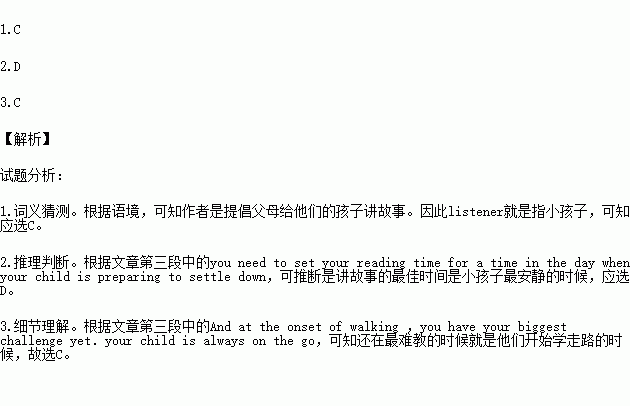题目内容
阅读理解。
We feel it important to start reading to your child right from the start –the younger the better! With little ones(children from birth to 4)it is very important to read and reread books.Starting early makes the job of the listener(for you will be teaching your child how to listen) easier,as it helps to develop an early love of the written and spoken word.
We believe that you should read aloud to your child at least once every day .Set a special reading time during the day or evening when you can settle down(安静下来) and enjoy a book,without interruption.For most families,reading aloud at bedtime is a common practice.
We understand that it can be quite discouraging to read to a child who takes no interest .Take heart! Learning to listen takes experience .The more you read ,the more your child will learn to sit for a story .Children have a natural development of responses(反应)to your reading .By the time your child reaches6-7 months,she/he is attracted by the book in your hand ,and would like to test it out by using it as a chew(咀嚼)toy.This is natural! By one year,your child is learning to listen and talk about the pages,often shouting out things she/he recognizes.Encourage this! And at the onset (起始)of walking ,you have your biggest challenge yet.your child is always on the go.you need to set your reading time for a time in the day when your child is preparing to settle down.This means bedtime.Remember,it is your right and duty to teach your child about the power of books.Of course ,it doesn’t happen overnight,but the returns are great!
1.Who does “the listener” in the first paragraph refer to?
A.The writer B.The parent
C.The child D.The teacher
2.The best time of the day to read stories to a child is ______.
A.when the child is still active in the early evening
B.when the parents finish the day’s housework
C.when the child has a chew toy to play with
D.when the child is quiet and peaceful
3.Parent may find it most difficult to read to their child when she/he _______.
A.is 6-7 months old B.is one year old
C.start to walk D.start to talk
 阅读快车系列答案
阅读快车系列答案
